Figuring out what content to create on a regular basis is enough of a challenge, but ensuring that the content actually gets found and creates conversions continues to elude many of us. Using keyword data from search and organic marketing will give you some insight into your audiences’ interests, how they’re talking about your industry, and where they’re going to get their information and to have conversations.
I recently interviewed Erin O’Brien, COO at GinzaMetrics about keyword best practices for marketing strategy. During the interview she offered some practical advice about how to find the most relevant keywords to improve existing content, create better content, and stay ahead of the competition.
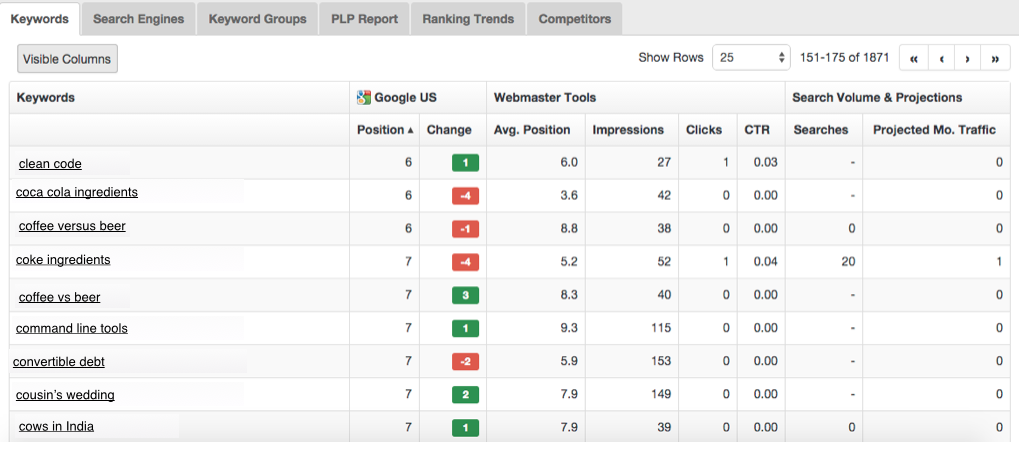
Can you define keywords in relationship to marketing?
Erin: Keywords are the targeted topics and words that you want associated with your brand, as well as how your audience finds you. There are a couple of important things to remember here. The first is that keywords don’t have to just be words, they can be phrases, products, features, taglines, etc. The second thing to remember is that your targeted keywords may not be what’s really driving traffic to your content, so it’s important to look for keywords from both angles:
- The ones you want to drive traffic
- Those that audiences are actually using – so you’re sure to have the most accurate information.
How does someone go about finding relevant keywords for their brand and content?
Erin: There are a lot of ways to find out what keywords are driving traffic to your content, although fewer now due to Google’s “keyword not provided” update last year. If you’re not in charge of SEO at your brand but someone is – I’d start by asking them for a list of keywords including rank and search volume data. You want both rank and volume data because you want to know what topics are currently working well for your brand’s content, as well as which are getting enough volume to warrant spending time on. For example, you may rank number one for a particular term but it may have low or no search volume. There’s a lot that can be said about watching how rank changes over time and what you can do with that data, as well as keyword rank for specific content – but let’s keep it simple for now.

If there isn’t someone at your organization who is responsible for SEO, I’d ask around to see if there’s any kind of analytics or platform in place that’s capturing this information. You can check out Google AdWords keyword planner tool if you’ve got an AdWords account. If not, there are tons of keyword tools you can use or give us a shout at Ginza and we can talk about using our platform. Either way, the ranking and search volume metrics, as a basic set of information, are good to start with.
How do you differentiate between what’s popular now, what’s good evergreen content, and what might help your audience convert?
Erin: Sometimes what’s popular, good long-term content, and what creates conversions are all the same thing, but not always. It’s important to think about keywords in a few different ways to maximize your use of them.
In terms of “popularity” what we’re really talking about here are trending topics, the things people are really excited about right now and are likely getting a lot of buzz on social media. Trending topics are great because you can create content that’s part of discussions happening right now that are top of mind. Keep in mind, a good way to leverage trending topics is to tie them back to larger, more evergreen issues that your audience has – so that you’re not only staying relevant to current issues but larger needs as well.
Talking about evergreen topics, these are your real bread and butter. These are things that your audience likely deals with on a regular basis. They’re likely also tied to goals they have, whether those goals are business related for B2B, or personal aspirations. By keeping at least a couple evergreen topics in your content and social media rotation you’ll be sure to appeal to the basic issues that your users struggle with, and be seen as a reliable place to go on the topic.
Now, both of these things create conversions, so that’s not necessarily a separate topic. That said, sometimes what creates conversions are appeals to budget, seasonality, or other needs that don’t always align with the trending topics or evergreen content. Keep in mind that keywords that create conversions are likely to shift throughout the year, or even throughout the month, so use a platform that allows you to keep an eye on it.
How can marketers use keyword data to improve existing content?
Erin: Any time you know what keywords and topics your audience is interested in, and what content they’re being driven to from those keywords – you have a much better chance of creating a conversion or making a sale.
When we’re talking about existing content, there are a few ways that marketers can use keywords to amp it up. The first is by knowing what keywords are already driving traffic to that content, then using those keywords in social media shares, email subject lines, landing page URLs, etc. Because you’re already ranking highly for these keywords it shows an existing positive relationship between that keyword and content – so use it to your advantage.
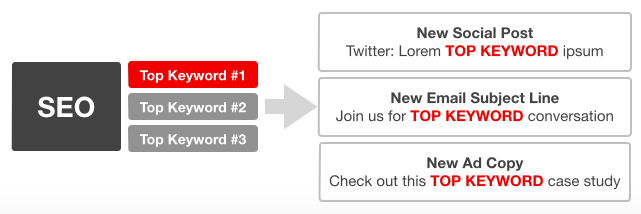
The next way you can use keywords to improve existing content is to look at what keywords are relevant and highly searched by your content and then go back and pick a couple of relevant pieces of content to give a refresh. This can include anything from adding a bit more depth to the content around that particular keyword, or making updates to header tags, meta descriptions, or other page structure elements. Ginza provides its users with recommendations at the page and site level, and page-level recommendations can be sorted by targeted keyword so you can actually try to optimize for the keyword selected.
Beyond improving existing content, how can marketers use keyword data to figure out what new content to create?
Erin: If you know what keywords your audience is looking at then you can naturally create better content to match it. I want to go back to the earlier segment when we were talking about popular / trending content, evergreen content, and conversion content here.
You should keep these three areas in mind when creating new content based on keywords because it will help you figure out what type of content to create and how much time and energy to expend on it. Here are a few of my personal guidelines:
For trending topics, I tend to create quick “create and consume” content. For example, I would maybe create a Pinterest board, hashtag for Twitter and Instagram, some quick Vines, or even a Google Hangout with live conversation about the topic – anything that you can put together in less than an hour. The reason is the ROI is not going to be there for something that took you three days to put together and get approved if the conversation is already mostly over by the time you get your content done.
For evergreen topics and keywords, I want a variety of content types that work together to engage the audience. For example, I might have email, landing pages, blog posts, ads, social, videos, and infographics all working together. I don’t care what anyone says about infographics being “over”, people still click on them constantly. Just don’t do one if you can’t take the time to do it right. Since we’re talking about evergreen, it’s important that you’ve got some attention to SEO here because you’ll want organic traffic as opposed to tons of paid, which stops working when you stop writing checks. High ranking content stays high ranking. There are blog posts and landing pages out there ranking in the top three from 2009. Good content is good content.
Now, when it comes to conversion content, remember I said these can be the same as trending and evergreen. Keep in mind, though, if you’re talking about a page specifically designed to convert someone with a specific action, that you’ve thought through all the types of actions that an audience member might take. For example, what’s the best conversion for a trending topic versus a longer standing audience member who has visited you before and is looking at evergreen issues? Sometimes you’re just going for initial engagement and an intro to your brand, while other times you’re looking for a purchase or a form fill right then and there.
How can marketers discover new keywords that they might not already be tracking – and why is that important?
Erin: Discovering new keywords is difficult for many marketers because it’s not at the forefront of their mind and it’s not a feature offered in a lot of tools. While social media tools will offer trending topics and related topics, what you really need is a combination of not just what people are talking about but the content that’s associated with those conversations.
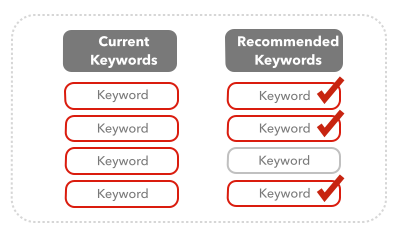
In terms of options for doing this, baked into the GinzaMetrics platform is keyword discovery and competitor discovery – based on your content and current targeted keywords.
If you’re not using our platform, or one that will provide this information, then I’d suggest doing what we call a discovery board. Discovery boards can take the form of a spreadsheet or a word document, whatever works best for you. Discovery boards come from visiting forums, Facebook posts, LinkedIn, and sometimes blog posts to observe what your potential users’ problems and concerns are and what’s being proposed to solve them.
- Problems mentioned by potential users
- Suggested solutions and hypothesis for how to solve the issue
- Tools mentioned in responses
- Best practices in use
- Keywords/phrases used
From this information you can decide what people are talking about, how they’re talking about it, and what kind of messaging you can develop to directly address that issue or concern.
What can marketers learn from competitor keyword data to create better content?
Erin: While it might seem kind of obvious to use competitor keyword data to create better content, there are a lot of missed opportunities with making the most of this information.
A few things to look for with competitor keyword data include:
- What keywords and topics are they increasing in rank for and gaining a lot of traction around right now? This data will show you where they’re concentrating efforts as well as where they’re doing a great job matching content to your target audience’s needs.
- Also with competitor keywords, you’ll want to see where they’re outperforming you in terms of rank for your highly targeted keywords and what content is associated with them – this will give you an idea of what your audience is really looking for and how to either modify existing content or create new content that better serves the need.
- Along the same lines as what content they’re performing well for on your targeted keywords, you can also use this information to create similar content, but using new mediums. For example, if your competition has a high ranking blog post for a targeted keyword, consider making a video, infographic, Slideshare, or other content addressing the same topic – since it’s something that your audience is interested in.
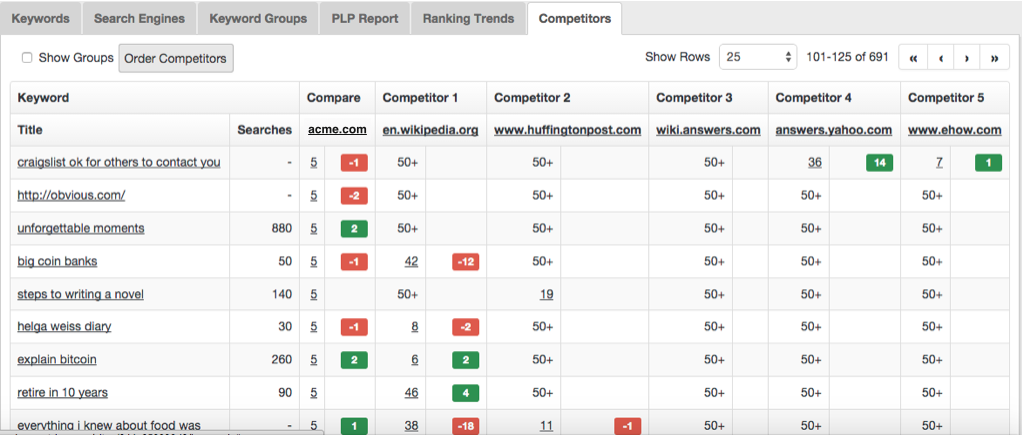
I’d also like to point out that competitor discovery is an important part of keyword discovery and competitor analysis. Since we’ve discussed it in previous shows I won’t go into it too much but the idea is, you know about the competitors you are already tracking, but what about the brands and companies that are ranking for your keywords that you aren’t following? The market and competitor landscape change regularly, so keeping an eye on who else is creating content that’s attracting your audience is critical in staying ahead of the curve.
We’ve got more information on competitor discovery on the GinzaMetrics website if you’re looking for details.
How often should marketers be updating/expanding keyword lists?
Erin: I haven’t gotten to say, “It depends” yet on this show, so I’m going to use that now. It does depend on a few things:
First of all, your resources. Are you managing content, search and marketing yourself? If so, this might be something you have time for once a quarter. I would say that’s kind of the baseline for some general updates. If you use a platform that does automated keyword and content management this should be something you can go through pretty quickly because it will take care of most of the heavy lifting. Ideally, you should be keeping up with keywords and content as often as you’re rolling out new content campaigns and SEO initiatives. (Or basically any marketing initiative.)
Second, is the size of your market. If you’re in a rapidly growing or highly competitive space, you should keep an eye on keyword and topic changes as often as possible because it will help you stay ahead of your competitors and engage your audience.
If someone only has limited time to spend on using keyword data to create better content – what do you recommend they focus on?
Erin: I’d say there are a couple of important things that will help make a big difference.
The first is to know what keywords are ranking for each of your pieces of content. This will tell you what specifically is driving your audience to that content and will help you share and promote it more effectively. It’s also a good time to consider making similar forms of that content in other mediums, such as videos, ads, ebooks, white papers, etc.
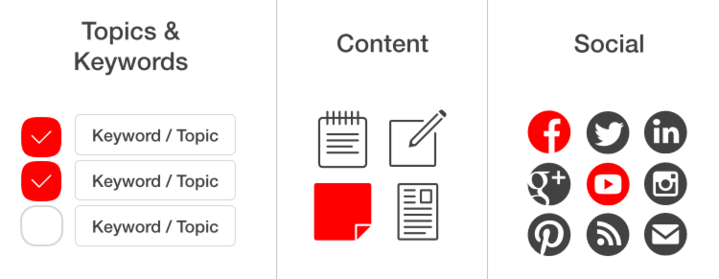
The second thing I would suggest is understanding what content your competitors are ranking for in your target keywords, because this will tell you where you’re losing audience members and what is working that they want to consume. Here’s another opportunity to create content around that same topic and keywords but in different forms.
I want to finish by stressing that I’m not suggesting you take content and copy it from competitors. Like I said last week, that’s going to be bad for SEO and it’s just lazy marketing. What I mean is that if someone has created some content, let’s say a beginners guide to SEO, and it’s a downloadable PDF on their website. I don’t need to copy their content into a blog post and call it a day. What I might want to do is start a video series on how to handle SEO for people new to it. Or maybe I want to make a Slideshare that addresses beginning SEO for agencies. Take what’s working, understand the keywords and what about the content is working – and then leverage that information to do smarter marketing.

